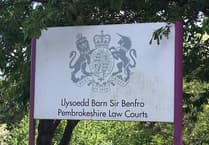Welsh?
‘Caerphilly’ cheese that were never made in Caerphilly.
‘Scotch’ tweeds that were not manufactured in Scotland.
‘Irish’ goods that never came from Ireland, and
‘Welsh’ flannels that are neither made in Wales or out of Welsh wool or by Welshmen.
The very fact that false names are attached to imitations prove that the genuine articles excel in some points over all other goods of the same class and, owing to demand for the genuine goods being more than supply, or for the sake of extra profit, there are manufacturers by the score who will make imitations of every good article out if inferior materials, and palm them off on the public as the genuine goods.
Welsh goods are about the greatest sufferers nowadays; so-called ‘Welsh’ flannels are manufactured by large English manufacturers, some all wool, some half wool and some have but very little wool, but not Welsh wool.
The bulk of the ‘Welsh’ goods sold in England, and in some shops even in Wales, are entirely imitation.
Welsh flannels, serges, tweeds, yarns and blankets, made from the long stapled Welsh wools, are world renowned for their particularly hard wearing qualities, and everything in ladies’ or gent’s wearing apparel can now be had in real Welsh.
If you would like to see the genuine articles, please write or call at - where they get the wools from the neighbouring farmers and have it manufactured by Welshmen on Welsh looms in this extreme end of Wales.
(-the above advertisement appeared in the Pembroke County Guardian in 1912).
The blame game
The Guardian claimed a scoop recently when it ‘revealed’ that the dairy farming industry does not have a market for tens of thousands of male calves born each year.
The report confirms the numbers being disposed of at birth are due to the lack of viable markets for bull calves and public apathy towards consuming young beef and British rosé veal.
The dairy industry body AHDB states that it is working with the farming union’s to work on the issue, but that dairy farmers must not be left to carry the blame.
AHDB said that finding markets for bull calves was a key aim of the industry-led Dairy Cow Welfare Strategy, which started in 2010, but that there was no quick fix.
“We will have to wait and see what this stakeholder group can achieve because it is trying to create and influence the market. This is not something that can be done overnight,” an AHDB spokesperson said.
“The bottom line is that we need a market outlet for these calves: if it’s not economic to rear them, farmers won’t. So, as a supply chain, let’s work on solutions rather than playing the blame game.
Ultimately, the answer lies with consumers in the purchasing decisions they make,” NFU dairy advisor Siân Davies told The Grocer magazine.
What colour is the wind?
Charlie Landsborough waited many years for his big break in the music industry and when it finally came he, not urprisingly, flew straight to the top.
Often in the evening, Charlie used to take his dog for a walk. His then young son would accompany him and, being acutely aware of his father’s passion for music, would regularly enquire about future plans his dad may have in the music industry.
“He was only little then, and would say: ‘Do you think you’ll ever make it, Dad?’ Some nights I’d be optimistic and say: ‘Yeah,’ and some nights I’d say: ‘No, I’m getting on a bit now son,’” explains Charlie.
Despite his varying thoughts on ‘making it,’ when many others would have thrown in the towel, Charlie persevered and went on to become a global country music star. He was in his 50s and had been playing the Merseyside pub scene for 22 years when he landed his big break.
Surprisingly, the What Colour is the Wind singer’s rise to fame came off the back of a huge disappointment. In 1995, he was set to support Foster and Allen on tour, but the supporting act was cut from the bill.
Despondent, but determined, Charlie refused to give up and, after a quick call to RTÉ, he ended up performing live on a show presented by Pat Kenny. The singer went down a treat and laughs that he has a lot to thank the Irish for.
“I had a great weekend in Dublin,” recalls Charlie, in his melodic Scouse accent. “I went home, me son picked me up and he said: ‘Dad, you’re in the Irish charts.’ I was like: ‘What am I, 98?’ And, I would have been delighted with that. He said: ‘No dad, you’re second.’”
“The following week, I was No 1, and my whole life was transformed in that short space of time. Come that spring, I was doing my own tour of Ireland with a band and everything, so it was like my own musical fairy tale, it was great.”
Catch ‘em young!
When animal science student Thian Carman sets his mind to something, there’s no stopping him. That’s how he became Nova Scotia’s youngest registered farm owner at 14-years-old.
“I always wanted to do something with animals,” said Carman, who is from Digby County and attends Dalhousie University’s Faculty of Agriculture. “I started raising chickens when I was younger. When my neighbour decided he was getting out of sheep, I bought all his old equipment and then started running my own farm.”
He started with 12 ewes and has been building gradually ever since - the farm has up to 80 ewes and about 150 acres of hay land.
“We wanted to start small to see how I liked it and I’ve been really enjoying it. It’s definitely something I want to do for the rest of my life.”
Running a farm wasn’t the only challenge Carman was tackling during his high school years. In grade four, he was diagnosed with a mixture of learning disabilities that make reading and writing difficult.
“If you teach me hands-on, I’ll do it right back to you, I learn perfectly,” he said. “If you verbally talk me through something, I will always have it. But if you give me a book and tell me to read it and ask what I got out of it, I’m going to have trouble with that.”
Carman admits the learning disabilities made school frustrating, but he stuck it out and made the most of the accommodations offered to him - extra time, scribes, and help reading tests - and graduated with good grades.
When Carman decided to give university a try, there was no question about where he’d apply.
“It’s funny because most kids apply to several universities and I only applied to one,” he said. “It was almost like there was no doubt. I got the letter back and that was that. I never thought I wouldn’t get in.”
Then he got the call last summer that he’d won a large scholarship through 4-H.
“I was so excited,” he recalled. “I applied through different scholarships but 4-H decided I was a good candidate for the L.E.A.D. scholarship.”
The 4-H Canada Leadership Excellence Awards of Distinction honour the accomplishments of members who demonstrate personal values, leadership, and community involvement that align with one of 4-H’s leadership development pillars. The scholarship is worth nearly £9,000.
Carman chose to major in animal science. His dream is to be a large animal vet but he didn’t know if his disability would make it too difficult to keep up with the programme.
Formulation challenges
As consumer interest in dairy alternatives climbs, so too does production of such products. Launches of dairy-alternative beverages, for example, have more than doubled globally since 2012.
Demand for dairy alternatives has transformed a niche category into a mainstream market, creating a global opportunity for food and beverage manufacturers to diversify their offerings.
However, these innovative products present a number of formulation challenges. Manufacturers not only must create foods and beverages with desirable taste and texture, but also ensure such products meet all the ancillary needs and desires of discerning consumers.
Fishy story
A guy called his wife one evening and said: “Honey, I’ve been invited to spend a week fishing with some of my best customers, but they’re leaving right away. Could you pack my clothes, my fishing gear, oh, and don’t forget my blue silk pyjamas. I’ll be home in a few minutes to pick them up.”
An hour later, he flew in the house, grabbed his stuff and raced off.
A week later, he returned. His wife asked, “Have a good week, dear?”
“Oh yes, honey. It was great! But you didn’t pack my blue silk pyjamas.”
His wife smiles and says, “Oh yes I did. They’re in your tackle box!”



